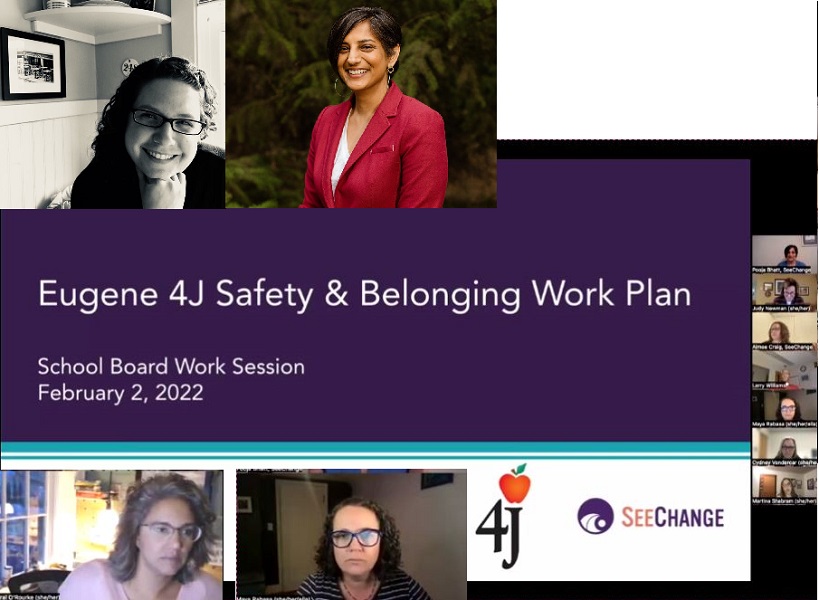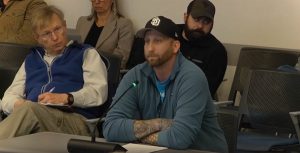To help students feel safe, 4-J addresses institutional racism
6 min read
The Eugene School Board looks to help students feel safe and welcome by addressing the racism deeply ingrained in our institutions.
How can Eugene’s school board help students feel safe? At a work session Feb. 2, 4-J board chair Judy Newman.
[00:00:07] Judy Newman: We hired SeeChange to do a landscape assessment of our policies, of our data, both student achievement and student discipline, talk, doing interviews with staff and just doing it really a 360 assessment of the district. And they gave us a report in August of 2021. So beginning in November of 2021, we re-contracted again with SeeChange to actually take the findings from their assessment and help us develop a work plan.
[00:00:45] Pooja Bhatt (SeeChange): The school board decided to end the contract with Eugene Police Department for SRO’s (School Resource Officers) effective December 2020. Shortly after that, the state of Oregon passed the Every Students Belong rule, to make sure that schools are safe places for everybody, regardless of race, and really taking a stance around having a bias-free and hate-free learning environment, which of course contributes to making sure that every student feels like they belong.
Thank you for supporting
local citizen journalism
[00:01:12] And in August of 2021, we presented this Student and School Safety Assessment to the board. What we found in that assessment was really that promising practices are happening throughout the district. For example, a lot of students are experiencing positive things like culturally-affirming learning environments, and many educators believe that there’s a focus on relationship building and social-emotional needs. And there is growing diversity in the educator workforce.
[00:01:41] At the same time we found that there’s some of the system infrastructure issues that appear in many districts throughout the state and throughout the country, frankly. And some of these issues are very longstanding and go beyond any individual and are really deeply rooted and entrenched in systems that we see throughout our society. In Eugene 4-J, that showed up as a disconnect between what students feel like are the most pressing safety issues around mental health and social-emotional needs, and what district resources and policies and practices we’re addressing.
[00:02:15] John Q: Pooja said since the pandemic, many students of color feel less safe.
[00:02:20] Pooja Bhatt: And the ways that students of color and teachers of color and staff of color and the district have been impacted or documented in the assessment that we provided last year, which is less belonging and safety for students and staff of color and disproportionate discipline, again, that we see in 4-J as well as many other districts throughout the country. A lot of these issues compounded with COVID have continued to exacerbate racial trauma for many folks of color, and with other intersections, all marginalized identities.
[00:02:49] John Q: SeeChange described the work plan, with activities starting next month. Aimee Craig then invited the board to talk about its role.
[00:02:57] Aimee Craig (SeeChange): We’ve defined goals for the work plan, with a focus on rules and structures for this school year. What could help the board clarify its role in safety and belonging? And what’s currently getting in the way of that clarity. This is a meaty question.
[00:03:12] Board Member Maya Rabasa: I want to shine a spotlight on one of the things that you all suggested already, and that’s the anti-racist training, because that feels crucial to me for understanding our role in safety and belonging within the district… As a board, we’re the ones who hold the key to reshaping the institution. So it feels like that element of anti-racist training not just as individuals, but as individuals who have the chance to affect this huge construct that we’re also challenged with, which is institutional racism.
[00:03:42] Aimee Craig: Thanks Maya. So seeing that work is part of unlocking even what your role is, how you lean into that role is doing that work together. Thank you. Laural?
[00:03:50] Laural O’Rourke: Is there space to hire somebody to actually look at it. I know you did some of this, but actually as far as implementation and working with staff? Because honestly, a lot of racism is happening constantly on this board and has happened from the district and on this board while I’ve been here and I’ve dealt with it as well as I can, but it’s not talked about. We just had, like, 25 people write in asking for Mary Walston to step down, which is amazing, but the response our leadership made did not mention at all the racism that was the reason for that happening.
[00:04:35] So while I am not the person who makes these decisions, what I see with that is, that we’re refusing to see what’s right in front of us. You know what I mean? It’s not the fact somebody should do something or not. It’s like you said, we’re at a high level right here. It’s here, it’s in front of us, I mention it. And it’s still like, ‘Nope, you need to be quiet.’ Because that’s the norm, that’s what’s been happening here for decades. So how do we do this work, when the people that are supposed to implement the work don’t understand the work that needs to be done or that it’s actually still happening. It’s so prevalent. I don’t know how to, I don’t know how to get past that, because nobody’s talking about what’s actually already happening.
[00:05:18] Aimee Craig: Yeah. So that feels like a huge barrier to you all being able to work together is just acknowledging the racism as it’s happening on the board and elsewhere. And I heard your request for support with external facilitation might be helpful.
[00:05:32] Laural O’Rourke: There are people out there that are the professionals who do come in and look at this and say, this is where we can shine, and help with our decision-making…. But I—, I don’t think we have a culture where people are free to talk, say what’s really happening. And when they do, many, I know this for a fact, they’re told they’re dangerous and they said they don’t move up in the organization.
[00:05:54] John Q: Aimee acknowledged Laural’s statement and asked for detailed recommendations.
[00:05:59] Aimee Craig: Are you talking about like individual coaching? Are you talking about something else?
[00:06:04] Laural O’Rourke: Yeah, individual coaching works. I don’t hold a lot of faith in anti-racism training, and there’s studies and information that backs me up on this. People get out of it, what they want to get out of it. There’s no, (laughs) ‘Okay, this is how we move forward and we’re going to change our whole—‘. We know this is embedded into our psyches.
So when I talk about it, I’m trying to shine a light and show it, but everybody hears it as, ‘You’re looking at me like I’m bad’, but I’m like, ‘Let’s look at this’. And everybody’s like, ‘Somebody make her be quiet.’ Or: ‘ Let’s find a way to shut down the voice.’ And when I talk about me in this, this is happening throughout our district. We have letters, we’re told about this over and over.
[00:06:47] So I look at this as what I’m seeing and what I’m dealing with is just like this narrow view, which has been fought the whole—I’ve been on the board, I think six months now, the entire time this has been happening. Can you imagine what is happening throughout the whole district? If it started like the first month I was on the board.
[00:07:08] So the reality is we need a third party doing this work with staff. But in the culture we have right now, people do not feel like they can talk freely because there are repercussions for that. This is not hyperbole. This is what we know about the culture in our district right now.
[00:07:26] Aimee Craig: Yeah. So coaching and that accountability piece or a third party who can be a voice who doesn’t have the same restrictions as someone who gets a paycheck from the district.
[00:07:37] John Q: How can an institution move past institutional racism? For the Eugene School District, one answer may be to reach outside the institution.






